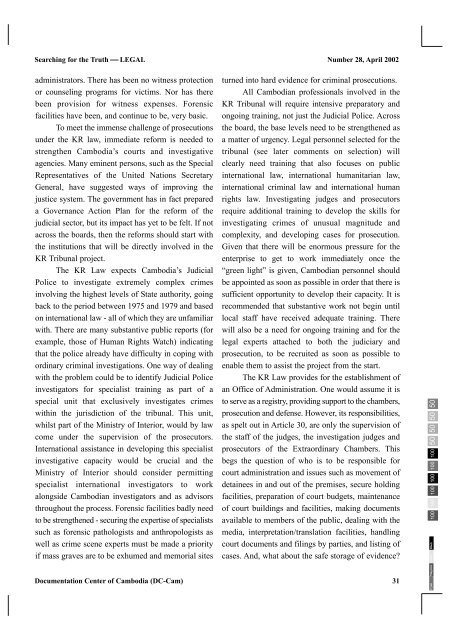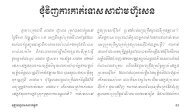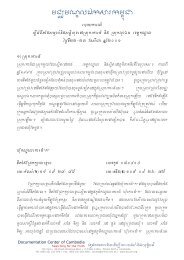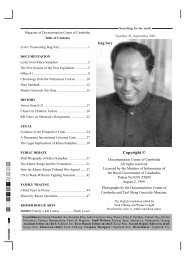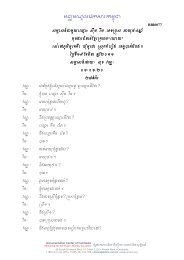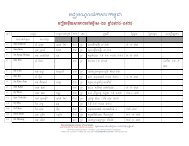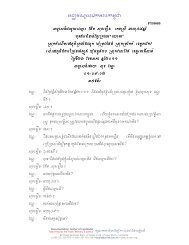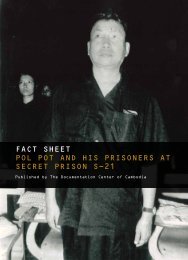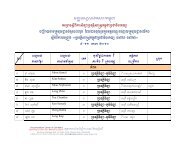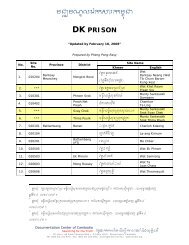Searching for the truth Issues 28 - Documentation Center of Cambodia
Searching for the truth Issues 28 - Documentation Center of Cambodia
Searching for the truth Issues 28 - Documentation Center of Cambodia
You also want an ePaper? Increase the reach of your titles
YUMPU automatically turns print PDFs into web optimized ePapers that Google loves.
<strong>Searching</strong> <strong>for</strong> <strong>the</strong> Truth ⎯ LEGAL<br />
administrators. There has been no witness protection<br />
or counseling programs <strong>for</strong> victims. Nor has <strong>the</strong>re<br />
been provision <strong>for</strong> witness expenses. Forensic<br />
facilities have been, and continue to be, very basic.<br />
To meet <strong>the</strong> immense challenge <strong>of</strong> prosecutions<br />
under <strong>the</strong> KR law, immediate re<strong>for</strong>m is needed to<br />
streng<strong>the</strong>n <strong>Cambodia</strong>’s courts and investigative<br />
agencies. Many eminent persons, such as <strong>the</strong> Special<br />
Representatives <strong>of</strong> <strong>the</strong> United Nations Secretary<br />
General, have suggested ways <strong>of</strong> improving <strong>the</strong><br />
justice system. The government has in fact prepared<br />
a Governance Action Plan <strong>for</strong> <strong>the</strong> re<strong>for</strong>m <strong>of</strong> <strong>the</strong><br />
judicial sector, but its impact has yet to be felt. If not<br />
across <strong>the</strong> boards, <strong>the</strong>n <strong>the</strong> re<strong>for</strong>ms should start with<br />
<strong>the</strong> institutions that will be directly involved in <strong>the</strong><br />
KR Tribunal project.<br />
The KR Law expects <strong>Cambodia</strong>’s Judicial<br />
Police to investigate extremely complex crimes<br />
involving <strong>the</strong> highest levels <strong>of</strong> State authority, going<br />
back to <strong>the</strong> period between 1975 and 1979 and based<br />
on international law - all <strong>of</strong> which <strong>the</strong>y are unfamiliar<br />
with. There are many substantive public reports (<strong>for</strong><br />
example, those <strong>of</strong> Human Rights Watch) indicating<br />
that <strong>the</strong> police already have difficulty in coping with<br />
ordinary criminal investigations. One way <strong>of</strong> dealing<br />
with <strong>the</strong> problem could be to identify Judicial Police<br />
investigators <strong>for</strong> specialist training as part <strong>of</strong> a<br />
special unit that exclusively investigates crimes<br />
within <strong>the</strong> jurisdiction <strong>of</strong> <strong>the</strong> tribunal. This unit,<br />
whilst part <strong>of</strong> <strong>the</strong> Ministry <strong>of</strong> Interior, would by law<br />
come under <strong>the</strong> supervision <strong>of</strong> <strong>the</strong> prosecutors.<br />
International assistance in developing this specialist<br />
investigative capacity would be crucial and <strong>the</strong><br />
Ministry <strong>of</strong> Interior should consider permitting<br />
specialist international investigators to work<br />
alongside <strong>Cambodia</strong>n investigators and as advisors<br />
throughout <strong>the</strong> process. Forensic facilities badly need<br />
to be streng<strong>the</strong>ned - securing <strong>the</strong> expertise <strong>of</strong> specialists<br />
such as <strong>for</strong>ensic pathologists and anthropologists as<br />
well as crime scene experts must be made a priority<br />
if mass graves are to be exhumed and memorial sites<br />
<strong>Documentation</strong> <strong>Center</strong> <strong>of</strong> <strong>Cambodia</strong> (DC-Cam)<br />
Number <strong>28</strong>, April 2002<br />
turned into hard evidence <strong>for</strong> criminal prosecutions.<br />
All <strong>Cambodia</strong>n pr<strong>of</strong>essionals involved in <strong>the</strong><br />
KR Tribunal will require intensive preparatory and<br />
ongoing training, not just <strong>the</strong> Judicial Police. Across<br />
<strong>the</strong> board, <strong>the</strong> base levels need to be streng<strong>the</strong>ned as<br />
a matter <strong>of</strong> urgency. Legal personnel selected <strong>for</strong> <strong>the</strong><br />
tribunal (see later comments on selection) will<br />
clearly need training that also focuses on public<br />
international law, international humanitarian law,<br />
international criminal law and international human<br />
rights law. Investigating judges and prosecutors<br />
require additional training to develop <strong>the</strong> skills <strong>for</strong><br />
investigating crimes <strong>of</strong> unusual magnitude and<br />
complexity, and developing cases <strong>for</strong> prosecution.<br />
Given that <strong>the</strong>re will be enormous pressure <strong>for</strong> <strong>the</strong><br />
enterprise to get to work immediately once <strong>the</strong><br />
“green light” is given, <strong>Cambodia</strong>n personnel should<br />
be appointed as soon as possible in order that <strong>the</strong>re is<br />
sufficient opportunity to develop <strong>the</strong>ir capacity. It is<br />
recommended that substantive work not begin until<br />
local staff have received adequate training. There<br />
will also be a need <strong>for</strong> ongoing training and <strong>for</strong> <strong>the</strong><br />
legal experts attached to both <strong>the</strong> judiciary and<br />
prosecution, to be recruited as soon as possible to<br />
enable <strong>the</strong>m to assist <strong>the</strong> project from <strong>the</strong> start.<br />
The KR Law provides <strong>for</strong> <strong>the</strong> establishment <strong>of</strong><br />
an Office <strong>of</strong> Administration. One would assume it is<br />
to serve as a registry, providing support to <strong>the</strong> chambers,<br />
prosecution and defense. However, its responsibilities,<br />
as spelt out in Article 30, are only <strong>the</strong> supervision <strong>of</strong><br />
<strong>the</strong> staff <strong>of</strong> <strong>the</strong> judges, <strong>the</strong> investigation judges and<br />
prosecutors <strong>of</strong> <strong>the</strong> Extraordinary Chambers. This<br />
begs <strong>the</strong> question <strong>of</strong> who is to be responsible <strong>for</strong><br />
court administration and issues such as movement <strong>of</strong><br />
detainees in and out <strong>of</strong> <strong>the</strong> premises, secure holding<br />
facilities, preparation <strong>of</strong> court budgets, maintenance<br />
<strong>of</strong> court buildings and facilities, making documents<br />
available to members <strong>of</strong> <strong>the</strong> public, dealing with <strong>the</strong><br />
media, interpretation/translation facilities, handling<br />
court documents and filings by parties, and listing <strong>of</strong><br />
cases. And, what about <strong>the</strong> safe storage <strong>of</strong> evidence?<br />
31<br />
100 100 100 100 100 100 50 50 50 50<br />
Black<br />
Yellow<br />
Magenta<br />
Cyan


